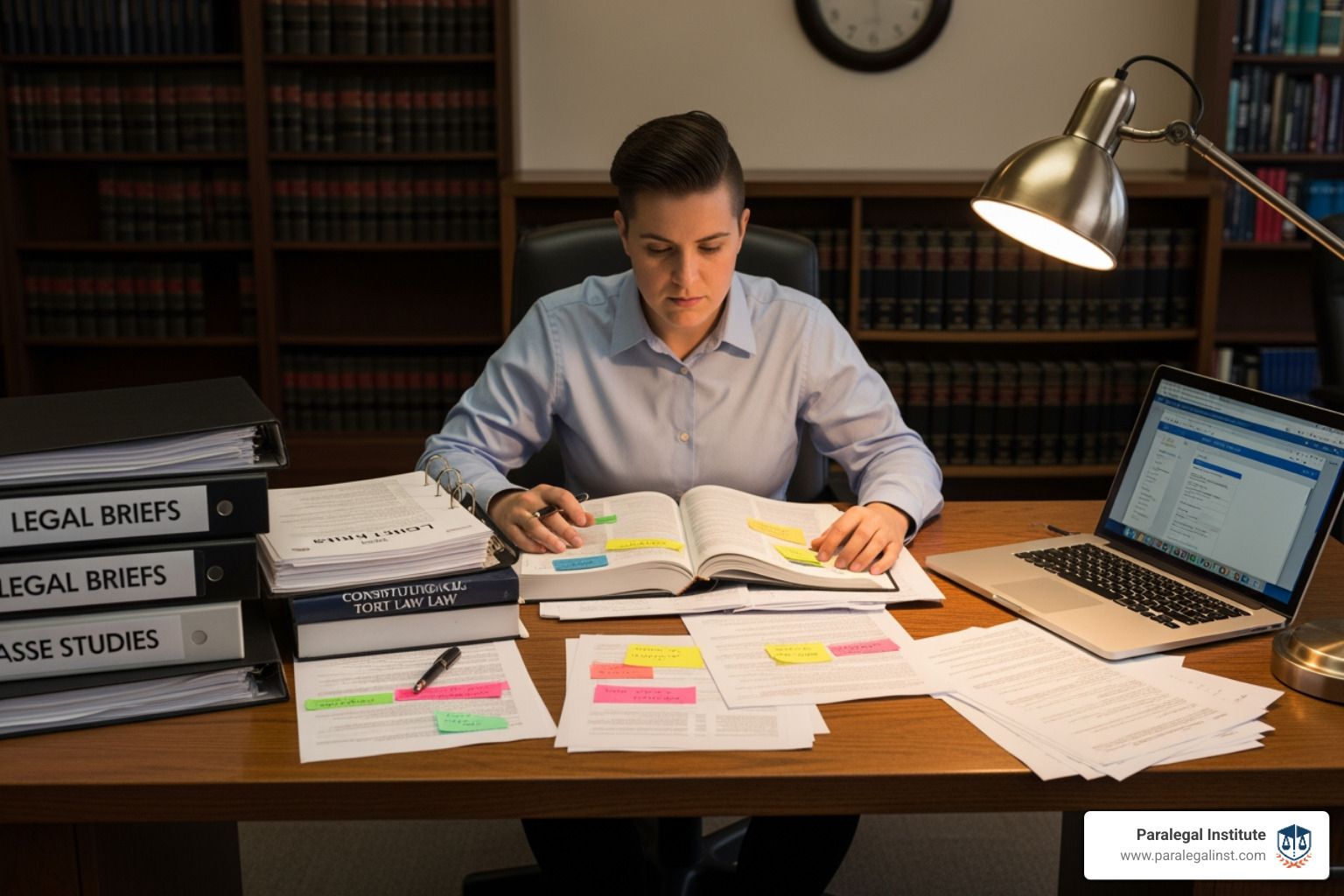Overcoming Imposter Syndrome in Paralegal Training
Imposter syndrome can creep up in surprising places, even in classrooms filled with eager learners ready to dive into the world of law. If you're a student in paralegal schooling, you may have already encountered this feeling. It's that nagging doubt in your mind, whispering that you don't belong, or that you're only fooling others into thinking you have what it takes. For paralegal students, these feelings of being an "imposter" can add an extra layer of stress to an already challenging journey.
Understanding and overcoming imposter syndrome as a paralegal student is an important step in building the confidence you need to succeed. It's not just about the technical skills but also about believing that you deserve to be in your program. In this article, we'll explore what imposter syndrome is, how it affects students, and some strategies to help you conquer it. Whether you're stepping into a classroom in Las Vegas or anywhere else, acknowledging and tackling these feelings will help you focus on learning and growing during your time in school.
Understanding Imposter Syndrome
Imposter syndrome is that inner voice that plants doubt in your mind despite your accomplishments. It's about feeling like you don't really deserve to be where you are, or that any minute now, someone will "find out" you're not as capable as others think. This syndrome is quite common among students. As you try to absorb new information, that doubt can sneak in, telling you that others grasp things faster or better, even when that's not true.
Being in a paralegal program in Las Vegas, you might feel surrounded by peers who seem to have it all figured out. This perception can make you question your own abilities more than you'd like to admit. Perhaps you're comparing yourself to others who seem to ace every exam or always have the right answer in class discussions. This comparison game can amplify feelings of inadequacy and stress.
What makes imposter syndrome particularly tricky is how it affects your studies and mental well-being. You might find yourself hesitating to ask questions or participate, fearing judgment or exposure. It can also lead to putting in extra hours on tasks because you're trying to "prove" yourself. Recognizing these patterns is the first step in addressing imposter syndrome.
Recognizing Symptoms of Imposter Syndrome
To address imposter syndrome, it's vital to recognize it first. Here are some signs students often experience:
- Self-doubt: Constantly questioning your abilities.
- Feeling like a fraud: Believing your achievements are due to luck, not skill.
- Overworking: Trying harder than necessary to prove your worth.
- Fear of failure: Constant anxiety about being exposed as a "fraud."
- Perfectionism: Setting unrealistically high standards, then feeling inadequate when they aren’t met.
These symptoms can take a toll on both your academic performance and your mental health. You might end up staying up late trying to perfect every little detail, only to feel like your efforts still aren’t good enough. This cycle of doubt and anxiety can drain your energy and enthusiasm, making school more taxing than it needs to be.
Recognizing these symptoms allows you to take steps to manage them. By understanding that these feelings are part of a common experience for many students, especially those stepping into challenging fields like paralegal work, you can start to shift your mindset. This awareness is a springboard to action, helping you approach your studies with more confidence and less self-imposed pressure.
Strategies to Overcome Imposter Syndrome
Taking control of imposter syndrome involves some proactive strategies. Here are a few ways paralegal students can tackle this feeling head-on:
1. Set Realistic Goals: Begin by setting small, achievable goals. This helps you focus on progress rather than perfection. Break tasks into smaller steps and celebrate each milestone. For instance, completing a chapter of study each night is a manageable target.
2. Seek Mentorship: A mentor can guide you through the challenges and reassure you when doubts arise. Having an experienced individual to share insights and affirm your capabilities can boost confidence significantly. Look for mentors among your professors or peers who have navigated similar paths.
3. Practice Self-Compassion: Be kinder to yourself. Understand that mistakes are part of the learning process. Remind yourself that feeling unsure doesn't mean you're any less capable. Acknowledge your efforts and allow yourself the space to learn and grow.
These techniques can help create a more positive learning environment, easing the grip of imposter syndrome.
Building a Support System
An essential part of overcoming feelings of inadequacy is having a strong support network. This can be a crucial asset in your journey through paralegal schooling.
- Peers: Surround yourself with classmates who understand the unique challenges of your path. Study groups can be a great way to build camaraderie and provide both academic and emotional support.
- Family and Friends: Sometimes, a chat with family or friends can provide perspective and encouragement. They can remind you of your strengths and help keep your self-doubt in check.
- Faculty and Staff: Don't hesitate to approach your instructors or staff members at your program. They can offer guidance, tips, and reassurance that you are on the right track.
Creating and maintaining this support system does wonders for personal growth throughout school and your future career. This collective encouragement will help fortify your belief in yourself as a capable paralegal student.
Finding Professional Help
There may be times when imposter syndrome feels overwhelming. If this is the case, seeking professional help can be beneficial. Consider talking to a counselor or therapist who understands these issues. They can offer personalized strategies to help you move past self-doubt.
Las Vegas offers several resources for mental health support. Whether it's through school or external centers, finding the right professional guidance can make a big difference. Knowing when to seek this help is a step toward healthier mindsets and academic success.
Embracing Progress and Celebrating Successes
A key part of managing imposter syndrome is taking the time to celebrate your achievements, no matter how small they might seem. Each successful project or exam passed is a testament to your hard work and dedication.
Reflect on your journey and recognize your growth and learning. Acknowledging this progress helps reinforce your sense of competence and dispels the notion that you're an "imposter."
Thriving in Paralegal School
Tackling imposter syndrome effectively is essential for thriving in paralegal school. By implementing strategies, building a robust support system, and celebrating your successes, you affirm your abilities and prepare yourself for a successful career.
Remember, every student experiences doubts at some point. Yet, it's how you manage these feelings that shapes your journey. Continue to grow, stay resilient, and take each step with confidence. Your dedication to overcoming these challenges will only serve to strengthen your skills and assure your place in the field.
If you're ready to take the next step in your journey and overcome obstacles like imposter syndrome, explore educational opportunities in paralegal schooling with Paralegal Institute. Our comprehensive programs in Las Vegas are designed to equip you with the skills and confidence needed to thrive in the legal field. Don't let doubt hold you back—embrace your potential and start your path to success today.










